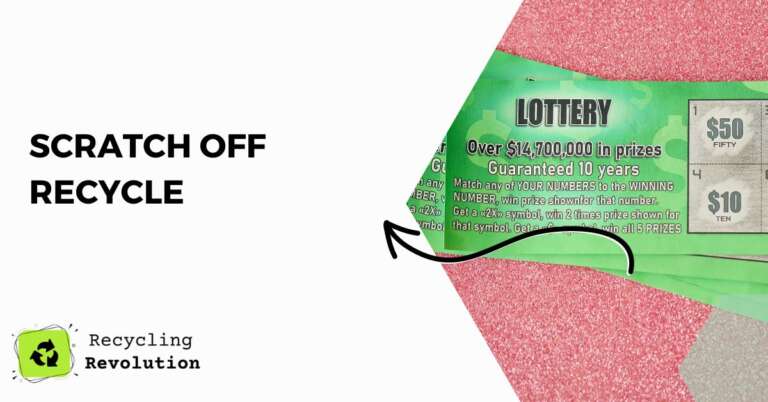Scratch off recycling is an innovative approach to repurposing used scratch-off tickets, which otherwise might end up in landfills. This practice goes hand-in-hand with the rising global concern about the environment and the need for sustainable practices.
From individuals to large-scale businesses, everyone can contribute to reducing waste and promoting a greener planet through scratch off recycling.
TL;DR: Scratch off recycling involves transforming used scratch-off lottery tickets and similar materials into usable products, reducing waste and promoting sustainability. I recommend adopting this practice as an effective step towards environmental responsibility.
The Concept Behind Scratch Off Recycle
The fundamental idea behind scratch off recycle is simple, yet profoundly impactful. It’s all about reusing what would otherwise be waste material. This concept, known as the “Circular Economy,” emphasizes resource efficiency and minimizes waste.
Used scratch-off tickets, with their distinctive silver scratch-off layer, can often be recycled into new materials. This layer is usually made of latex, which can be stripped off and the paper underneath recycled.
Steps to Scratch Off Recycling
- Collect Used Scratch-Offs: The first step is gathering used scratch-off tickets. The more, the better, since bulk recycling is more cost-effective and efficient.
- Separate the Layers: Next, carefully remove the latex scratch-off layer from the paper underneath.
- Recycle the Paper: Once the layers are separated, the paper part of the ticket can be recycled in any standard paper recycling bin or facility.
- Dispose of the Latex Layer: The latex layer can’t typically be recycled in standard facilities. However, it may be possible to find specialized facilities or methods to repurpose this material.
- Choose Sustainable Alternatives: Finally, as an individual or business, you can choose to purchase products made from recycled scratch-off tickets, supporting the whole process.
Scratch Off Recycle: The Environmental Impact
The scratch off recycle process contributes significantly to minimizing environmental waste. Notably, it helps decrease the number of non-recyclable materials sent to landfills.
Additionally, it plays a role in conserving our natural resources. By recycling used scratch-off tickets, we reduce the need for raw materials to create new products, which consequently reduces deforestation and energy consumption.
Understanding the Complexity of Scratch Off Recycle
The process of scratch off recycle might appear simple on the surface, but there’s a complex science that underpins it.
Scratch-off tickets, like other laminated papers, are a mixed material product. This means they combine different types of materials, in this case, paper and latex.
Separating these different components is the first challenge in the recycling process. While most household recycling programs don’t offer this service, certain commercial or specialized recycling facilities might be equipped to handle this task.
The Recycling Process
As previously mentioned, the first step in recycling scratch-off tickets involves separating the latex layer from the underlying paper. This is usually achieved through a mechanical process that uses water and agitation to break the bond between the two materials.
Once the layers are separated, the paper can be sent to a traditional recycling facility where it’s mixed with water to create a slurry. This slurry is then cleaned, de-inked, and finally, the water is removed, leaving behind recycled paper pulp. This pulp can be used to create a range of new paper products.
The latex layer, on the other hand, is more challenging to recycle. However, innovative solutions are emerging. For instance, some facilities are exploring options to grind the latex into a fine powder that can be used in the manufacturing of various products like rubber mats and even asphalt for road construction.
Role of Technology in Scratch Off Recycling
Recycling is a rapidly evolving field, with constant advances in technology and processes. Advanced recycling technologies, such as hydropulping and near-infrared (NIR) sorting, are playing a pivotal role in making the recycling of mixed materials, including scratch-off tickets, more efficient and sustainable.
For instance, hydropulping, a process commonly used in paper recycling, can also be used to separate the paper and latex layers in scratch-off tickets. Near-infrared sorting, on the other hand, can help identify and separate different materials based on their specific infrared signatures.
Challenges and Possible Solutions
While scratch off recycle has immense potential, it’s not without its challenges. One of the main issues is that the collection and separation of used scratch-off tickets can be labor-intensive and time-consuming. Additionally, there’s the challenge of creating a sustainable market for products made from recycled scratch-off tickets.
One potential solution could be the introduction of deposit-return schemes for scratch-off tickets. This would incentivize consumers to return their used tickets for recycling, similar to how bottle deposit schemes work.
Furthermore, promoting and supporting businesses that create products from recycled scratch-off tickets can help develop a sustainable market.
The Importance of Individual Contribution
The success of scratch off recycle depends heavily on individual action. Even seemingly small actions, such as collecting used scratch-off tickets instead of discarding them, can add up to have a significant impact.
By making a habit of recycling scratch-off tickets and educating others about the importance of this process, individuals can play a vital role in promoting this practice. Remember, every ticket recycled is a step towards a more sustainable planet.
Tips and Recommendations for Scratch Off Recycle
I recommend implementing the following practices to maximize the benefits of scratch off recycling:
- Make a habit of collecting and recycling scratch-off tickets.
- Raise awareness about this recycling process among friends, family, and your local community.
- Support businesses that promote and utilize recycled scratch-off tickets.
- Investigate local recycling options and guidelines to ensure correct disposal and recycling practices.
Note: Each locality may have different regulations and facilities for recycling, so it’s crucial to understand and follow these to maximize your recycling efforts’ effectiveness.
The Future of Scratch Off Recycle
With the growing need for sustainable practices, scratch off recycling is more relevant than ever. As recycling technologies advance, we might see more efficient methods for recycling scratch-off tickets, including the latex layers. This will result in a more comprehensive recycling process, further reducing waste and promoting sustainability.
In the future, I anticipate more businesses will adopt this approach, creating a ripple effect throughout industries. The cumulative impact of these actions could lead to significant environmental benefits.
Conclusion
Scratch off recycling is a small, yet significant step towards a more sustainable planet. It embodies the concept of the circular economy, turning waste into resources, and promotes environmental responsibility.
By participating in scratch off recycling, we can contribute to lessening our environmental impact and move towards a more sustainable future.
FAQ
Can all scratch-off tickets be recycled?
It largely depends on the materials used to make the tickets. Most contain a paper base that can be recycled, but some types may not be recyclable.
Where can I recycle scratch-off tickets?
The paper portion of the ticket can typically be recycled in any standard paper recycling bin. The latex portion may require specialized recycling.
What are some products made from recycled scratch-off tickets?
Many paper products, such as notebooks, greeting cards, and more, can be made from recycled scratch-off tickets.
Note: Always check local recycling regulations and facilities to ensure you’re recycling correctly.

